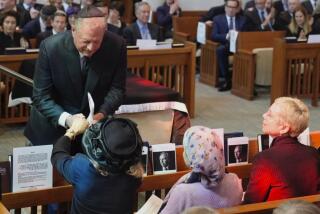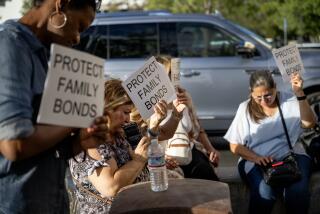Faith and Politics in America
Re “The Lieberman Test for Multiethnic America,” Opinion, Sept. 24: I’m shocked at the anti-Jewish article you published. Gregory Rodriguez commended Joseph Lieberman for abandoning his faith’s prohibition of Jews marrying non-Jews. He writes, “But the rub comes when an adherent to what can be considered an ancient tribal principle seeks to represent all Americans in an executive office.”
In other words, my belief in the Torah means I’m adhering to an ancient tribal principle and disqualifies me from any American executive position? Those are the kinds of thoughts I’d expect from the Nazis, or the KKK, or Louis Farrakhan--but in The Times? I’m disgusted with you for publishing those sentiments.
PAUL S. ALMOND
Los Angeles
*
What purpose was Rodriguez’s article intended to serve other than to spread anti-Jewish feelings? It is well known that Lieberman supports affirmative action. Even more offensive was the prominent position given his article by The Times. The goal of multiculturalism is to end discrimination based on race, religion, sex, etc. A homogenous gene pool is not necessary to achieve this goal; tolerance and respect will suffice. The result of universal intermarriage would be the disappearance of human variety. For Jews, particularly, assimilation means our end as a people.
ANNE WOLKOWITZ
BETTE WOLKOWITZ
Los Angeles
*
Rodriguez takes Sen. Lieberman to task for personally adhering to the “ancient tribal principle” of endogamy. But recommending that one’s children marry within the faith is not confined to Jews; all religions share a desire to see their group perpetuated and, not incidentally, to advise their young to avoid the conflicts that often arise in interfaith relationships.
Rodriguez concludes with a plea for the United States to move toward a “new ideology of hybridity.” He fails to define that term, but it sounds suspiciously like the discredited doctrine of universal brotherhood propounded by the revolutionaries of 19th century Europe and the communists of the 20th century.
ARTHUR M. COHEN
Los Angeles
More to Read
Get the L.A. Times Politics newsletter
Deeply reported insights into legislation, politics and policy from Sacramento, Washington and beyond. In your inbox three times per week.
You may occasionally receive promotional content from the Los Angeles Times.










